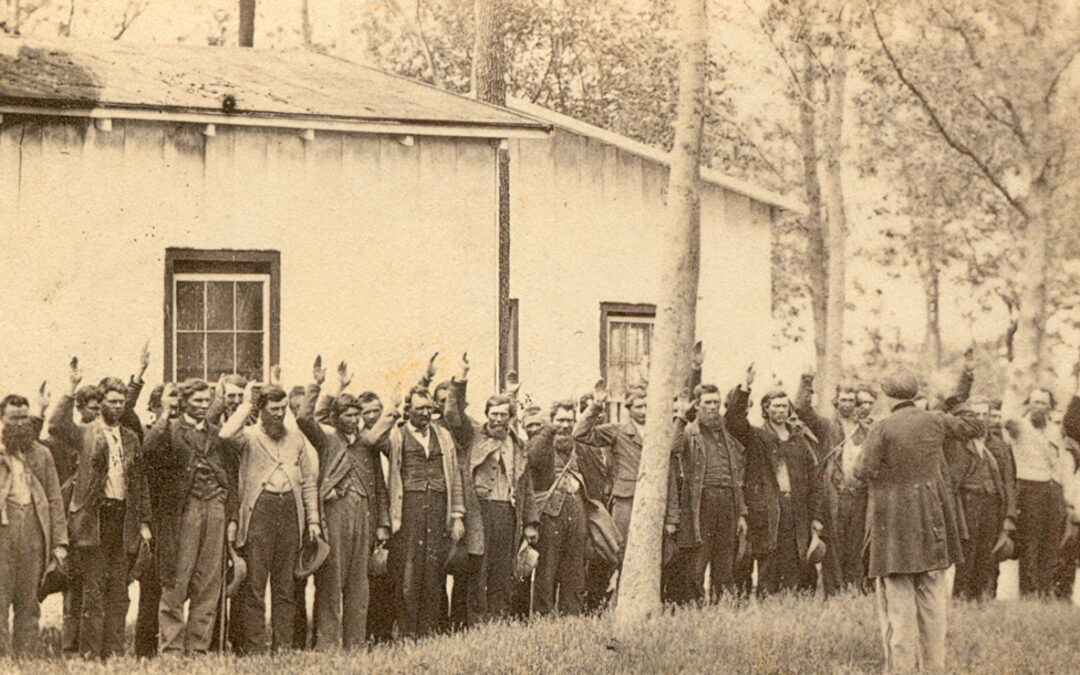
by Bret Capranica | Sep 3, 2013 | Blogging, Featured Articles, Ordinary Pastor, Pastoral Ministry, Personal
Another re-post from over 4 years ago. I post it again as THE CAPRANICA re-launches its regularity as a reminder of what this blog is about. I am an ordinary pastor. That is, I know myself well enough and I have been around enough extraordinary pastors to be well aware of how ordinary I am. The content, regularity, and writing style found here at THE CAPRANICA all document the degree of my ordinariness. Actually, I enjoy being ordinary. Obscurity is often bliss. Normality, more often than not, is a blessing. The front-lines of the ordinary contain enough excitement, challenge, heartache, and doldrum to keep me focused and engaged in the Lord’s work. I have been an ordinary pastor for over 20 years (I began ministry in 1988 in a rural Texas Panhandle church) and I have never been bored with ministry; I’ve always been busy, and I’m as excited today about serving the church as I was twenty years ago when I began. I really do enjoy being among the ordinary. Ordinary is not often publicly celebrated, but ordinary pastors dominate the landscape of church life across our country; we are, by far, the vast majority. In reality, only a small percentage of pastors in the world could really be called or evaluated as extraordinary. I thank God for many of them . The Savior has used (and still does) a few of them in many influential ways in my life and ministry. Yet, most of us who serve the Lord as local church shepherds will not host presidential forums; books will not host our names as authors; national...

by Bret Capranica | Aug 29, 2013 | Biblical Studies, Eschatology, Expositions, Featured Articles, Pastoral Ministry, Preaching
How do you prepare yourself during the week to engage with God and participate in corporate worship on Sunday? Every week our church gives a number of ways to interact with the passage to be preached, and lists the songs that will be sung, in order to help our congregation be better prepared. These posts will also begin to populate THE CAPRANICA each Thursday. Carefully Think Read Daniel 1:1; 2:1; 5:1, 30, 31; 6:1; and 10:1. Where is Daniel? How many kings does he interact with? Read Daniel 1:1-20; 2:26-28; 6:1-10. Why is Daniel where he is and how would you characterize his character? Glance through the headings in your Bible of Daniel 1-6. Make a list of the sort of events recorded about his life. Glance through the headings in your bible for Daniel 7-12. What are these chapters primarily about? Read 12:5-13. What era of human history is being described in these events and when will they be completed? Read Daniel 2:20-23; 4:2-3, 34-35; 6:25-27; 7:9-10, 13-14. What is emphasized about God in these chapters? Prayerfully Meditate What do you learn about Daniel, his friends and what commitment to God looks like in the midst of opposition? Have you every experienced opposition from those outside of Christianity to your faith? When? How? How would Daniel be a helpful example to you? How could Daniel’s overt, God-centered life-style instruct you and how you conduct yourself at work, in your neighborhood, or in our culture generally? Read Daniel 9:1-19. How could this be a helpful prayer to model your own (or congregational) confession of sin? What is the primary...

by Bret Capranica | Aug 27, 2013 | Blogging, Featured Articles, Ordinary Pastor, Personal
For many months now I’ve been wanting to take up contributing to my neglected blog presence. As the mayhem begins again, I start with a re-post (from over 4 years ago) of an article on why an ordinary pastor, like me, should regularly blog. Wouldn’t blogging be persona non grata in the life of the truly ordinary pastor? Maybe a few years ago, but no longer. I would suspect that the majority of pastors blogging today are among the ordinary variety. It helps that more than 99% of the pastors in our country are ordinarily flavored, so you would expect that the same percentage of pastors blogging will be ordinary pastors. With that in mind, why should a pastor blog? I wish more extraordinary pastors blogged – I mean really blogged. Not like those guys who have their staff post excerpts from their books. I wish they would actually take a half-hour each day and write something about their life, ministry, personal discipline, reading habits, family life, and the very unique experiences they have in ministry. It’s good to hear from some of the extraordinary guys who share from the overflow of their vast amount of time in the Scriptures and years of experience. But I also like hearing from the average Joe. In fact, I think there are a host of reasons why an ordinary pastor should blog. Here’s my list: It humanizes the ministry, allowing people to see the past the ivory tower facade. It allows you to speak to issues you could not cover in your sermon (even though your sermon was too long already). It gives another...

by Bret Capranica | Oct 13, 2012 | Featured Articles, Pastoral Ministry, Preaching
Carefully Think Read Matthew 5:38-42. Summarize in one sentence what the main idea is. How does Matthew 5:38-42 fit with the idea Jesus expressed in 5:17-20? Read Exodus 21:24; Leviticus 24:20; and Deuteronomy 19:21. What are these passages teaching about retaliation? Why would the OT emphasize this? How do these OT passages help you understand what Jesus is referring to in 5:38? Is Jesus contradicting the OT passages in 5:39? Why or why not? List the illustrations Jesus gives about retaliation in 5:39-42. What is the emphasis of each one uniquely (i.e., what is the issue with being slapped verses being sued, etc.)? Is Jesus advocating pacifism in these verses? Are Christians not to defend themselves? Is Jesus suggesting that we not advocate justice? Why – why not? Prayerfully Meditate How are Christians supposed to apply these concepts in 5:38-42 in day-to-day living? Over what sort of issues are you most prone to seek personal vengeance? How could you cultivate the default attitude of trusting God and not seeking revenge when taken advantage of? What sort of patterns of thinking would you need to develop? How could this affect how you pray for those who are unjustly taking advantage of you? What would help motivate a person to respond the way Jesus is advocating? How does the message of the gospel help cultivate this sort of response? Think back to what Jesus suffered. How did he respond? Why did he respond as he did? How would his responses be helpful in our cultivating a similar response? Intentionally Act Have you been expressing any personal animosity or vengeful attitudes toward...

by Bret Capranica | Oct 6, 2012 | Christian Living, Featured Articles, Pastoral Ministry, Preaching
Carefully Think Read Matthew 5:33-37. Summarize in one sentence what Jesus’ main point is. How does this passage relate to what Jesus said in 5:17-20? What are the similarities and differences between this passage and the previous sections (anger: 5:21-26; lust: 5:27-30; divorce: 5:31-32)? Read through the following OT passages: Exodus 20:7; Leviticus 19:12; Numbers 30:2; Deuteronomy 23:21-23. What background to the give to what Jesus says in Matthew 5:33-37? In what ways does Jesus define “do not take an oath at all” in 5:34-36? What does this suggest about the nature of an oath or what is involved in the kind of oath Jesus is referring to? Why does Jesus indicate that one should not take an oath and call heaven, hearth, Jerusalem, or your own head to account for the oath? What is Jesus’ point in bringing up these examples? Instead of taking an oath, what is the primary focus of a righteous person? Prayerfully Meditate Why does Jesus attack giving oaths? Does this include taking an oath in a court room or for those who serve political office? Why or why not? In the course of daily living, why would an oath be necessary? What are the greatest challenges to honesty? When are you most tempted to lie? Why are we often tempted to hedge the truth in what we say we will do? What would it take for you to be able to live in such a way that your “yes” or “no,” is believably sufficient? Intentionally Act As you think about the way you approach your own personal commitments, what needs to change in...

by Bret Capranica | Sep 27, 2012 | Featured Articles, Marriage and Family, Pastoral Ministry, Preaching
Carefully Think Read Matthew 5:31-32 Where did this instruction originally come from in the Old Testament? What is the connection between 5:31-32 to 5:27-30? What is the connection between 5:31-32 and 5:17-20? Is Jesus contradicting what was said in the OT by his statement in 5:32? Why or why not? Who are the various parties that Jesus indicates are guilty of sin in 5:32? Why would divorce and remarriage except on the grounds of immorality cause someone to commit adultery? Prayerfully Meditate Divorce is a prevalent and painful subject in our society. What are some of the modern day challenges with what Jesus says about divorce in 5:31-32? Why are they so challenging? What is Jesus saying about marriage in these verses? Why would immorality be legitimate grounds for divorce? Read 1 Corinthians 7:10-24. What grounds for divorce does Paul give? Read Matthew 19:1-9. What are the similarities and differences to 5:31-32? In light of the above passages and considerations, what elements would make for a stronger marriage? If you or someone you know has pursued divorce for unbiblical reasons, how could you helpfully serve them? How could you help a person who has legitimate grounds for divorce think through their heart attitudes and approach to the situation? Intentionally Act Has God put anyone on your heart in thinking through these issues? Pray for them to have a heart for God and a desire to obey His word. Plan a time to talk with them about what God’s word says on the issue. Do you and your spouse need to talk through what would make for a stronger marriage...













